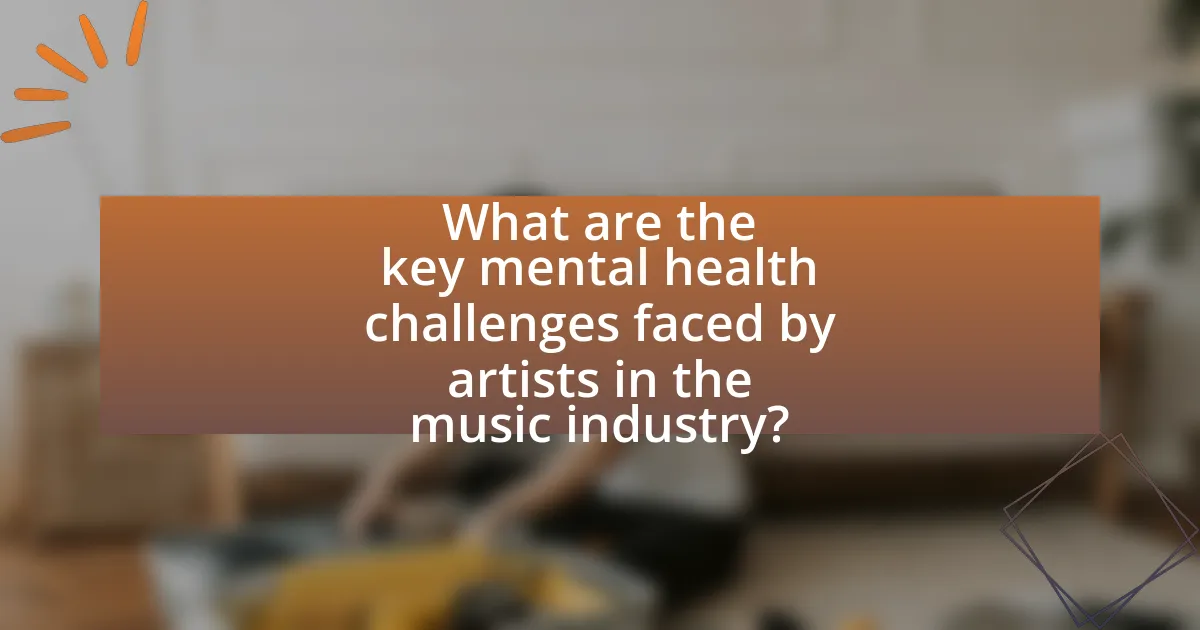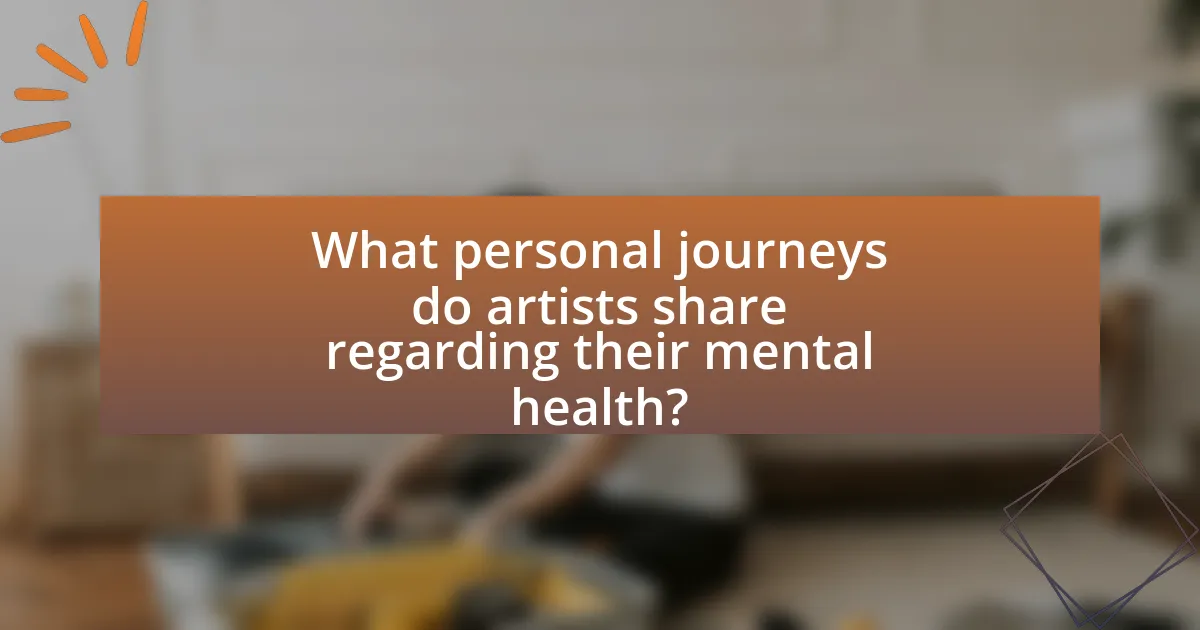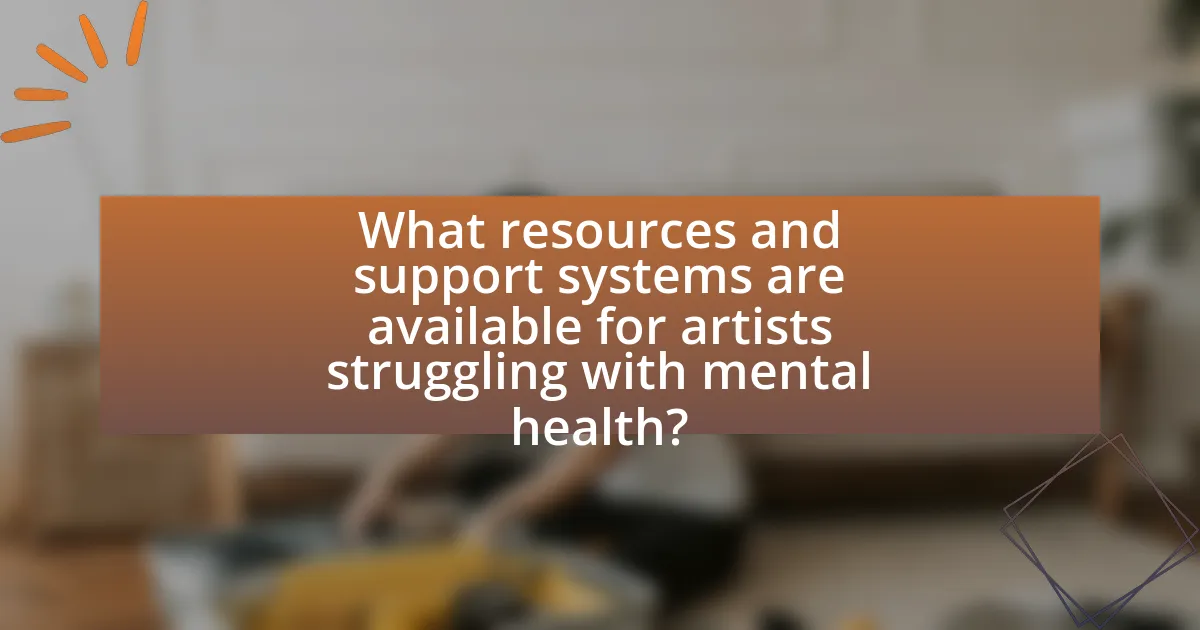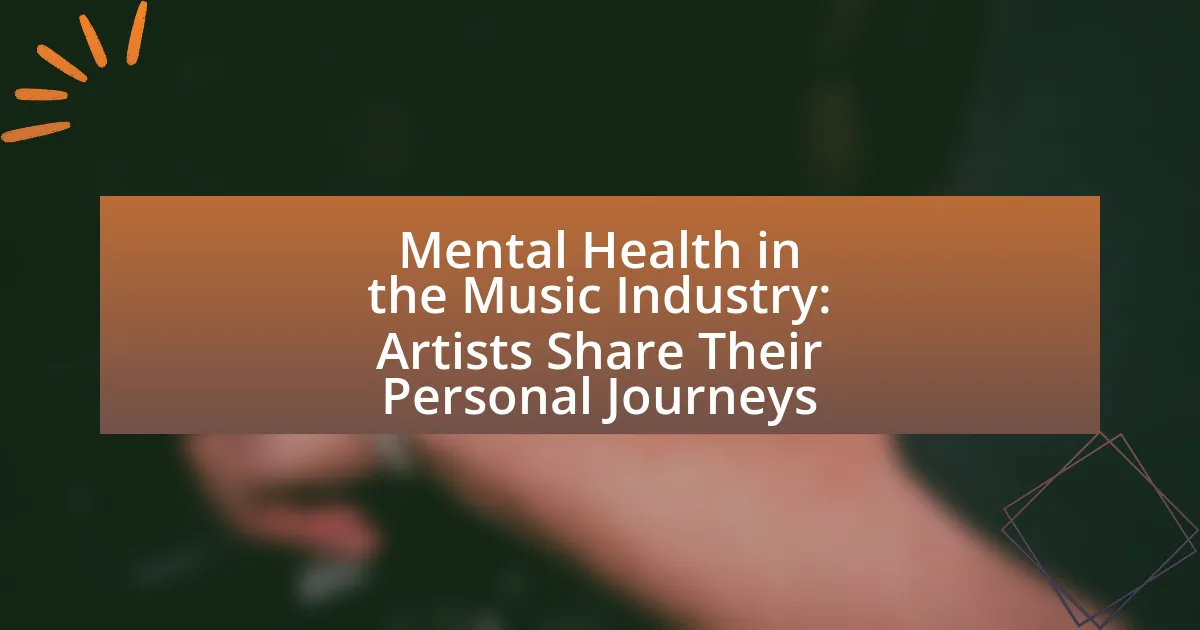The article focuses on the mental health challenges faced by artists in the music industry, highlighting issues such as anxiety, depression, substance abuse, and the pressures of fame. It examines how public scrutiny and competition contribute to these mental health struggles, as well as the coping mechanisms artists often employ, including substance use. The piece also discusses the importance of personal narratives in destigmatizing mental health issues and the initiatives launched by artists to promote awareness and support within the industry. Additionally, it outlines available resources and strategies for musicians to maintain their mental well-being, emphasizing the need for community and professional support.

What are the key mental health challenges faced by artists in the music industry?
Artists in the music industry face several key mental health challenges, including anxiety, depression, substance abuse, and the pressures of fame. Anxiety often arises from performance-related stress and the constant scrutiny of public life, with studies indicating that musicians are at a higher risk for anxiety disorders compared to the general population. Depression can stem from feelings of isolation and the emotional toll of creative expression, with research showing that musicians report higher rates of depressive symptoms. Substance abuse is prevalent as artists may turn to drugs or alcohol as coping mechanisms for these mental health issues, with surveys revealing that a significant percentage of musicians have struggled with addiction. Additionally, the pressure to maintain a public persona and the fear of failure can exacerbate these challenges, leading to a cycle of mental health deterioration.
How do the pressures of fame impact mental health?
The pressures of fame significantly impact mental health by increasing stress, anxiety, and depression among individuals in the public eye. Research indicates that high levels of scrutiny and public expectation can lead to feelings of isolation and inadequacy, as seen in studies like the one conducted by the American Psychological Association, which found that celebrities often experience heightened anxiety due to constant media attention and criticism. Additionally, the demands of maintaining a public persona can exacerbate existing mental health issues, leading to substance abuse and burnout, as reported in various case studies of artists in the music industry.
What specific stressors contribute to anxiety and depression among musicians?
Specific stressors that contribute to anxiety and depression among musicians include performance pressure, financial instability, and social isolation. Performance pressure arises from the expectation to consistently deliver high-quality performances, which can lead to intense anxiety and fear of failure. Financial instability is prevalent in the music industry, where many musicians struggle to secure a stable income, leading to stress and feelings of inadequacy. Social isolation often occurs due to the demanding schedules and lifestyle of musicians, which can result in a lack of support networks and exacerbate feelings of loneliness and depression. These factors collectively create a challenging environment that significantly impacts the mental health of musicians.
How does public scrutiny affect artists’ mental well-being?
Public scrutiny negatively affects artists’ mental well-being by increasing stress, anxiety, and feelings of inadequacy. The constant evaluation of their work and personal lives can lead to mental health issues, as evidenced by studies indicating that high levels of public criticism correlate with increased rates of depression among artists. For instance, a survey conducted by the Music Industry Research Association found that 70% of musicians reported experiencing anxiety related to public perception, highlighting the detrimental impact of scrutiny on their mental health.
What role does substance abuse play in the mental health of musicians?
Substance abuse significantly impacts the mental health of musicians by exacerbating existing mental health issues and creating new psychological challenges. Research indicates that musicians are at a higher risk for depression, anxiety, and substance use disorders, with studies showing that approximately 70% of musicians experience mental health issues at some point in their careers. The pressures of the music industry, including performance anxiety and the demands of touring, often lead musicians to self-medicate with drugs or alcohol, which can result in a cycle of dependency and worsening mental health. For instance, a study published in the Journal of Music Therapy found that musicians who engage in substance abuse are more likely to report feelings of isolation and emotional distress, further complicating their mental health landscape.
How do artists use substances as coping mechanisms?
Artists often use substances as coping mechanisms to manage emotional pain, stress, and the pressures of their creative careers. This reliance on substances, such as alcohol or drugs, can provide temporary relief from anxiety, depression, or feelings of inadequacy that many artists experience. Research indicates that a significant number of musicians report using substances to enhance creativity or escape from the harsh realities of their lives, with studies showing that around 70% of musicians have struggled with substance abuse at some point in their careers. This behavior can lead to a cycle of dependency, where the initial relief becomes a source of further emotional and physical challenges, ultimately impacting their mental health and artistic output.
What are the long-term effects of substance abuse on mental health?
Long-term substance abuse significantly deteriorates mental health, leading to conditions such as depression, anxiety, and psychosis. Research indicates that individuals with a history of substance abuse are at a higher risk for developing these mental health disorders due to neurochemical changes in the brain. For instance, a study published in the journal “Psychological Medicine” found that prolonged use of substances like alcohol and opioids can alter brain function and structure, exacerbating mental health issues. Additionally, the National Institute on Drug Abuse reports that substance abuse can lead to cognitive impairments, including memory loss and decreased decision-making abilities, further complicating mental health recovery.
How does the music industry culture influence mental health?
The music industry culture significantly influences mental health by fostering high levels of stress, competition, and isolation among artists. This environment often leads to mental health issues such as anxiety, depression, and substance abuse. For instance, a study published in the Journal of Music Therapy found that musicians are three times more likely to experience depression compared to the general population. Additionally, the pressure to maintain public personas and meet industry expectations can exacerbate feelings of inadequacy and loneliness, further impacting mental well-being.
What are the expectations placed on artists regarding performance and productivity?
Artists are expected to consistently deliver high-quality performances and maintain a prolific output of creative work. This expectation stems from the competitive nature of the music industry, where success is often measured by commercial viability and audience engagement. For instance, artists are frequently required to release new music, tour regularly, and engage with fans through social media, which can lead to significant pressure and stress. Research indicates that this relentless demand can adversely affect artists’ mental health, as they struggle to balance creativity with the commercial aspects of their careers.
How does competition within the industry affect mental health?
Competition within the music industry negatively affects mental health by increasing stress, anxiety, and feelings of inadequacy among artists. The pressure to succeed and outperform peers can lead to burnout and depression, as evidenced by a study published in the Journal of Music Therapy, which found that musicians often experience higher levels of mental health issues compared to the general population. Additionally, the constant comparison to others can exacerbate feelings of isolation and low self-worth, further impacting emotional well-being.

What personal journeys do artists share regarding their mental health?
Artists often share personal journeys of struggle with mental health issues such as depression, anxiety, and substance abuse. For instance, musicians like Kurt Cobain and Amy Winehouse have openly discussed their battles with depression and addiction, highlighting the pressures of fame and the impact on their mental well-being. Additionally, artists like Lady Gaga and Logic have used their platforms to advocate for mental health awareness, sharing their experiences with anxiety and suicidal thoughts, which resonate with many fans. These narratives not only provide insight into the challenges faced by artists but also foster a sense of community and understanding among those dealing with similar issues.
How have artists openly discussed their struggles with mental health?
Artists have openly discussed their struggles with mental health through interviews, social media, and their music. For instance, musicians like Demi Lovato and Kid Cudi have shared personal experiences with depression and anxiety, using platforms like Instagram and interviews to raise awareness and reduce stigma. Additionally, songs such as “1-800-273-8255” by Logic directly address mental health issues, providing listeners with resources and encouraging conversations about these challenges. This openness has contributed to a broader dialogue within the music industry, highlighting the importance of mental health support for artists and fans alike.
What platforms do artists use to share their stories?
Artists use social media platforms, such as Instagram, Twitter, and Facebook, to share their stories. These platforms allow artists to connect directly with their audience, providing a space for personal narratives and mental health discussions. For instance, a survey by the Pew Research Center indicates that 69% of adults in the U.S. use social media, making it a vital tool for artists to reach a broad audience and foster community engagement around their experiences.
How do personal narratives help destigmatize mental health issues?
Personal narratives help destigmatize mental health issues by providing relatable experiences that challenge societal misconceptions. When individuals share their stories, they humanize mental health struggles, making them more accessible and understandable to others. Research indicates that personal accounts can reduce stigma by fostering empathy and connection; for instance, a study published in the journal “Psychological Science” found that narratives can significantly alter perceptions of mental illness, leading to increased acceptance and support. By openly discussing their challenges, artists in the music industry contribute to a broader cultural shift that normalizes mental health conversations and encourages others to seek help.
What are some notable examples of artists advocating for mental health awareness?
Notable examples of artists advocating for mental health awareness include Lady Gaga, who has been vocal about her struggles with PTSD and founded the Born This Way Foundation to support mental health initiatives. Similarly, Logic released the song “1-800-273-8255,” which addresses suicide prevention and led to a significant increase in calls to the National Suicide Prevention Lifeline. Additionally, Selena Gomez has openly discussed her battles with anxiety and depression, using her platform to promote mental health education and awareness. These artists have utilized their influence to foster conversations around mental health, demonstrating the impact of their advocacy.
How have these artists influenced public perception of mental health?
Artists have significantly influenced public perception of mental health by openly discussing their struggles and experiences, thereby reducing stigma. For instance, musicians like Lady Gaga and Logic have used their platforms to advocate for mental health awareness, leading to increased conversations around the topic. Lady Gaga’s Born This Way Foundation promotes mental wellness, while Logic’s song “1-800-273-8255” directly addresses suicide prevention, resulting in a 50% increase in calls to the National Suicide Prevention Lifeline after its release. These actions have contributed to a cultural shift, encouraging individuals to seek help and fostering a more supportive environment for mental health discussions.
What initiatives have artists launched to support mental health in the industry?
Artists have launched various initiatives to support mental health in the music industry, including the establishment of mental health organizations, awareness campaigns, and support networks. For instance, the organization “Music Minds Matter,” initiated by Help Musicians UK, provides mental health support specifically for musicians, offering services like counseling and advice. Additionally, artists like Billie Eilish and Shawn Mendes have used their platforms to raise awareness about mental health issues, encouraging open discussions and reducing stigma. These initiatives are crucial as studies indicate that musicians face higher rates of mental health challenges compared to the general population, highlighting the need for targeted support within the industry.
What lessons can be learned from artists’ experiences with mental health?
Artists’ experiences with mental health reveal the importance of vulnerability and openness in addressing mental health issues. Many artists, such as Billie Eilish and Logic, have openly discussed their struggles with anxiety and depression, highlighting that sharing personal experiences can foster connection and reduce stigma. Research indicates that creative expression can serve as a therapeutic outlet, allowing artists to process their emotions and experiences, which can lead to improved mental well-being. Furthermore, the prevalence of mental health challenges in the music industry underscores the need for support systems and resources tailored to artists, as evidenced by initiatives like MusiCares, which provides assistance to musicians facing mental health issues.
How do these experiences shape the music they create?
Experiences related to mental health significantly shape the music artists create by influencing their lyrical content, emotional expression, and overall sound. For instance, artists often draw from personal struggles with anxiety, depression, or trauma, translating these feelings into relatable lyrics that resonate with listeners. Research indicates that musicians who confront mental health challenges frequently produce work that reflects their emotional states, leading to authentic and impactful music. A study published in the Journal of Music Therapy found that songwriting can serve as a therapeutic outlet, allowing artists to process their experiences and connect with audiences on a deeper level. This connection not only enhances the emotional weight of their music but also fosters a sense of community among listeners who may share similar experiences.
What coping strategies have artists found effective?
Artists have found several coping strategies effective for managing mental health challenges, including mindfulness practices, physical exercise, and establishing supportive social networks. Mindfulness techniques, such as meditation and deep breathing, help artists reduce anxiety and improve focus, as evidenced by studies showing that mindfulness can enhance emotional regulation. Regular physical exercise is also beneficial, as it releases endorphins that improve mood and reduce stress, a fact supported by research from the Mayo Clinic. Additionally, building strong social connections provides emotional support, which is crucial for mental well-being, as highlighted in studies indicating that social support can mitigate the effects of stress and promote resilience among artists.

What resources and support systems are available for artists struggling with mental health?
Artists struggling with mental health can access various resources and support systems, including mental health hotlines, therapy services, and peer support groups. Organizations like MusiCares provide financial assistance and mental health resources specifically for musicians, while the National Alliance on Mental Illness (NAMI) offers educational materials and support networks. Additionally, online platforms such as BetterHelp and Talkspace connect artists with licensed therapists for remote counseling. Research indicates that 73% of musicians experience anxiety or depression, highlighting the importance of these support systems in addressing mental health challenges within the industry.
What types of mental health services are accessible to musicians?
Musicians have access to various mental health services, including therapy, counseling, support groups, and wellness programs specifically designed for the music industry. These services often address issues such as anxiety, depression, and substance abuse, which are prevalent among musicians. For instance, organizations like MusiCares provide mental health resources and support tailored to the unique challenges faced by artists. Additionally, many musicians utilize online therapy platforms, which offer flexible and confidential access to mental health professionals.
How can artists find therapists or counselors who understand the music industry?
Artists can find therapists or counselors who understand the music industry by seeking professionals who specialize in creative arts therapy or have experience working with musicians. Many therapists list their specialties on professional directories, such as Psychology Today or TherapyDen, where artists can filter for those with expertise in the music field. Additionally, organizations like the Music Industry Therapist Directory provide resources specifically for artists looking for mental health support tailored to their unique challenges. Research indicates that therapists familiar with the music industry can better address issues like performance anxiety and the pressures of fame, making it crucial for artists to prioritize finding such specialized support.
What role do music organizations play in providing mental health support?
Music organizations play a crucial role in providing mental health support by offering resources, programs, and community engagement tailored to the needs of artists and industry professionals. These organizations often provide access to mental health services, such as counseling and therapy, specifically designed for individuals in the music industry, which faces unique stressors like performance pressure and public scrutiny. For example, initiatives like MusiCares offer financial assistance for mental health treatment and host workshops that promote mental wellness. Research indicates that musicians are at a higher risk for mental health issues, making the support from these organizations vital for fostering a healthier industry environment.
How can artists build a supportive community around mental health?
Artists can build a supportive community around mental health by openly sharing their experiences and creating safe spaces for dialogue. By discussing their own mental health challenges, artists can foster empathy and understanding among peers and fans, which encourages others to share their stories. Research indicates that peer support significantly improves mental health outcomes, as seen in studies published in the Journal of Mental Health, which highlight the benefits of community engagement in reducing stigma and promoting well-being. Additionally, artists can collaborate on projects that raise awareness about mental health issues, such as benefit concerts or social media campaigns, further solidifying community bonds and providing resources for those in need.
What are the benefits of peer support among musicians?
Peer support among musicians provides emotional resilience, reduces feelings of isolation, and fosters a sense of community. Musicians often face unique stressors, including performance anxiety and industry pressures, making peer support crucial for mental well-being. Studies indicate that social support can significantly lower anxiety and depression levels, enhancing overall mental health. For instance, a survey by Help Musicians UK found that 71% of musicians reported feeling isolated, highlighting the importance of peer connections in combating loneliness and promoting mental health.
How can social media be used to foster connections for mental health support?
Social media can be used to foster connections for mental health support by creating online communities where individuals can share experiences and seek help. Platforms like Facebook, Instagram, and Twitter allow users to connect with others facing similar challenges, facilitating discussions that can reduce feelings of isolation. Research indicates that 70% of individuals who engage in online support groups report feeling less alone and more understood, highlighting the effectiveness of these digital interactions in promoting mental well-being. Additionally, artists in the music industry often use their platforms to openly discuss mental health issues, encouraging fans to share their stories and seek support, thereby normalizing conversations around mental health.
What practical tips can artists implement to maintain their mental health?
Artists can maintain their mental health by establishing a structured routine that includes regular breaks, physical activity, and mindfulness practices. Research indicates that routines can enhance emotional stability and reduce anxiety, which is crucial for artists facing the pressures of the industry. Additionally, engaging in physical exercise has been shown to release endorphins, improving mood and overall mental well-being. Mindfulness practices, such as meditation or deep-breathing exercises, can help artists manage stress and maintain focus, contributing to a healthier mental state.
How can mindfulness and self-care practices benefit musicians?
Mindfulness and self-care practices benefit musicians by enhancing their mental well-being and performance quality. These practices help reduce stress, anxiety, and burnout, which are common in the high-pressure environment of the music industry. Research indicates that mindfulness can improve focus and emotional regulation, leading to better creativity and performance outcomes. For instance, a study published in the Journal of Music Therapy found that musicians who engaged in mindfulness practices reported lower levels of performance anxiety and greater overall satisfaction with their musical experiences. By incorporating mindfulness and self-care, musicians can foster resilience, maintain their passion for music, and improve their overall quality of life.
What strategies can artists use to manage stress and anxiety effectively?
Artists can manage stress and anxiety effectively by incorporating mindfulness practices, establishing a routine, and seeking social support. Mindfulness practices, such as meditation and deep breathing exercises, have been shown to reduce anxiety levels and improve emotional regulation. A structured routine helps artists maintain a sense of control and predictability in their lives, which can alleviate feelings of overwhelm. Additionally, seeking social support from peers or mental health professionals provides a crucial outlet for sharing experiences and coping strategies, which is essential for mental well-being in high-pressure environments like the music industry.
